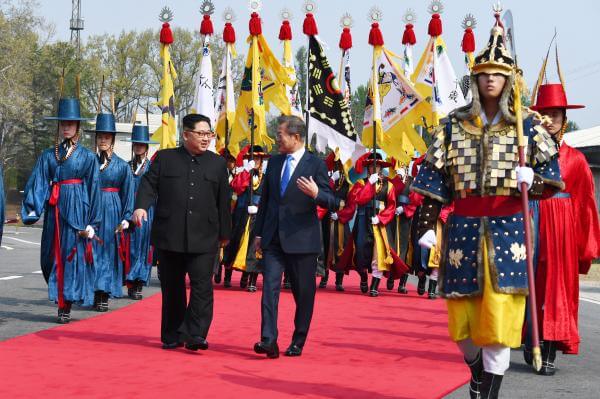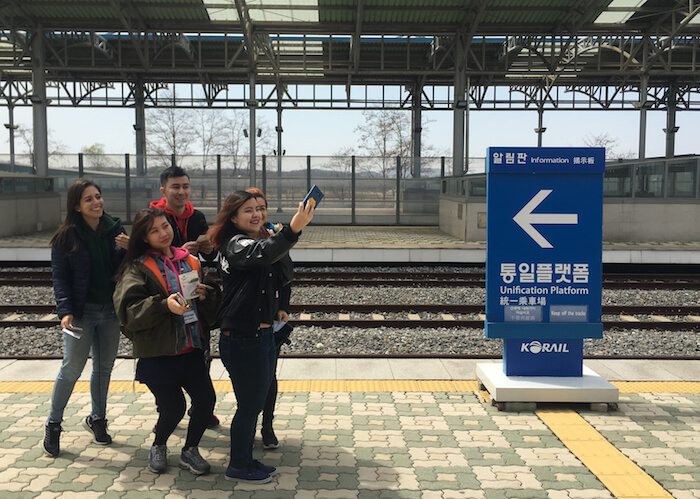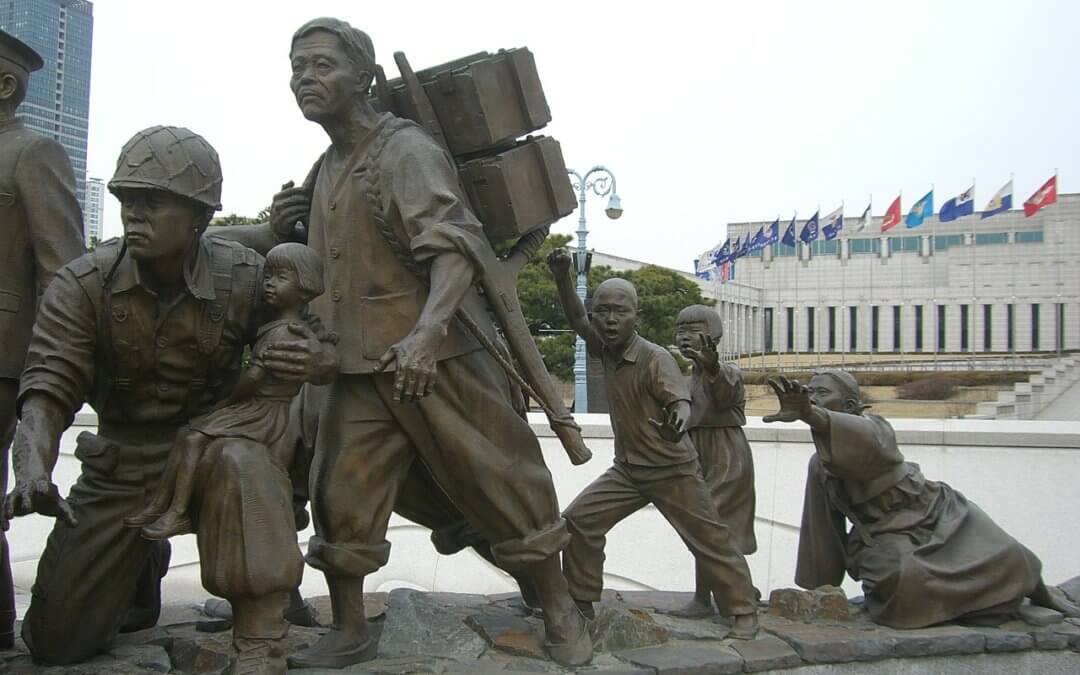Rae is an American. She recently spent two days camping out in the Demilitarized Zone (DMZ) with other International Peace Ambassadors. The workshop, organized by Global Peace Foundation and KISSA (Korean International Student Services Association) gave the International Peace Ambassadors first-hand insights on the humanitarian crisis in North Korea and the global potential of peaceful reunification through presentations, visits to spots along the DMZ and group discussions with perspectives from around the world.

South Korean President Moon Jae-in and North Korean leader Kim Jong-un are greeted with a welcoming ceremony at the DMZ for the Inter-Korea Summit. Photo by Korea Summit Press Pool/EPA-EFE
Less than a week ago, before the Inter-Korean Summits, the DMZ remained a symbol of the 65-year-old civil conflict between North and South Korea. With prospects for reunification, the lessons Rae carried back are more relevant now than ever before.
Rae reflected on lessons learned saying, “Conversing with individuals from Rwanda, Ukraine, Venezuela, Georgia, South Korea and even Natives of the North American continent regarding concepts of identity, human rights, and unity, I can say I have renewed resolve to continue these complex conversations.”
She goes on to reflect:
“As an American, I have the privilege of sheer exposure to diversity of every sort (ethnic, cultural, linguistic, ideological, etc.) And I better understand now that we should ‘think globally act locally,’ and reflect upon the individual cultures and experiences of those with whom we interact.
…The individual is sculpted by experience and stomping over those experiences thus erases the individual. Rather than shutting down others for being overly emotional or bringing in too much personal baggage, I encourage my friends and family to listen to the words and challenge themselves to reflect on what that individual or culture is bringing to the table and conversation. Speak, but above all, respect the speech of others by actively listening rather than waiting for your turn to talk.
[Our views are] shaped by [our] lives, and I believe that the amalgamation of us all is the source of the solution for this unification issue as well as other complex challenges facing my nation and the global community.”

International students in the Peace Ambassadors program pose at the empty platform of Dorasan Station.
Through these types of exchanges, students like Rae are discovering the importance of dialogue for domestic and international relations. When entering into dialogue with an all-inclusive framework of understanding, it provides a space to explore cultural roots and appreciate diverse cultures and traditions. Without such a broad, inclusive framework, such cultural explorations may work to build more walls and resistance against cooperation and dialogue.
Global Peace Foundation applies this same framework to the issue of Korean reunification based on the vision outlined in Korean Dream: A Vision for a Unified Korea. Its author, Dr. Hyun Jin P. Moon, offers a values-based approach to peaceful reunification rooted in Korea’s founding vision, expressed in the principles of Hongik Ingan and the cultural practices of the extended family system that have defined Korea for millennia.
The survival of any culture is a collective effort of the people. Although now divided for more than 70 years, Korea’s shared history and culture spans centuries. The effort for peaceful reunification lies in the hands of the people. High-level dialogue and inter-governmental relations alone cannot provide solutions to the crisis on the Korean peninsula. However, as reflected by Rae and other international ambassadors, citizens can make a difference at the grassroots level by exploring cultural roots and discovering a vision that can unite a divided homeland. It starts from civil society engagement.
Instead of viewing the issue of Korean unification as a challenge too great for one person, international students like Rae are taking it on together, starting from their own circles and communities. Rae is preparing to speak at the 2018 Peace Festival to be held in Korea.
No matter what country we call home, the lessons from the process of Korean reunification are for everyone.
Rae’s full reflection appears on Global Peace Foundation. Global Peace Foundation is an international non-sectarian, non-partisan, nonprofit organization, which promotes an innovative, values-based approach to peacebuilding, guided by the vision of One Family under God. GPF engages and organizes a global network of public and private-sector partners who develop community, national, and regional peace building models as the foundation for ethical and cohesive societies. Dr. Hyun Jin Preston Moon is founder and chairman of the Global Peace Foundation.

